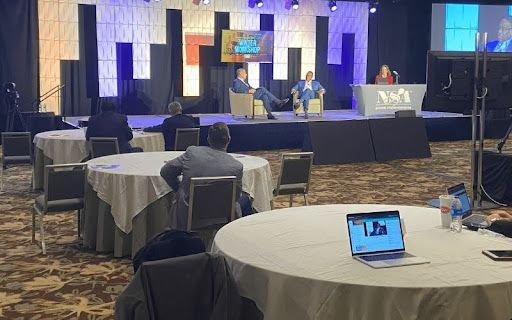Event Planning Trends 2025: Innovations and Ideas to Watch
The future of event planning is being shaped by rapid technological advancements, evolving consumer expectations, and a growing commitment to environmental responsibility. As we look ahead to 2025, it's clear that these trends are reshaping the way events are conceptualized, planned, and executed. Staying ahead of the curve is crucial for event planners who want to create memorable and impactful experiences.
This article provides insights into what 2025 holds for event planners, exploring the key trends that are set to dominate the industry. From sustainability and technology integration to personalization and innovative formats, these trends offer exciting opportunities for creating events that are both engaging and responsible.
Sustainability and Eco-Friendly Events
Sustainability is no longer a niche concept but a core principle in event planning. In 2025, we'll see even greater emphasis on eco-friendly practices.
Green Venues and Zero-Waste Initiatives
The demand for
sustainable event spaces is on the rise. Event planners are seeking venues that prioritize energy efficiency, water conservation, and waste reduction. Waste reduction at
events
is a major focus, with zero-waste initiatives becoming more common. This involves reducing single-use plastics and implementing thorough recycling and composting programs.
Sustainable Catering and Decor
Eco-friendly
catering options are gaining popularity, with a focus on locally sourced, organic, and plant-based menus. These choices not only reduce the carbon footprint of an event but also cater to the growing number of health-conscious and environmentally aware attendees. Similarly,
biodegradable materials are being used for decor, from bamboo and recycled paper to plant-based fabrics and compostable tableware. These sustainable choices enhance the aesthetic appeal of events while minimizing their environmental impact.
Integration of Technology in Event Planning
Virtual Reality and Augmented Reality Uses
VR event experiences are becoming more sophisticated, allowing attendees to immerse themselves in virtual environments, whether it's exploring a destination, experiencing a product demonstration, or participating in interactive games. AR for engagement is also gaining traction, overlaying digital content onto the real world. This can include interactive maps, virtual signage, and engaging photo opportunities, enhancing the attendee experience in a unique and memorable way.
Advances in Event Management Software
Software for event planners is becoming powerful and integrated. These
tech tools
for events streamline various aspects of planning, from registration and ticketing to communication and data analysis. Expect to see more AI-powered features, such as personalized recommendations, automated scheduling, and real-time analytics, helping planners optimize their events and improve attendee satisfaction.
Personalization and Customization Trends
Tailored Experiences for Attendees
The trend in event planning is toward creating customized experiences tailored to each attendee. By understanding individual preferences and behaviors, planners can offer personalized agendas, content recommendations, and networking opportunities that improve engagement and satisfaction.
Data-Driven Personalization Strategies
Using data in event planning is becoming increasingly important. By collecting and analyzing attendee data, planners can gain valuable insights into preferences, behaviors, and engagement patterns.
Attendee data analysis allows for highly targeted personalization, from customized email campaigns to personalized on-site experiences. This data-driven approach allows for personalized experiences that make each attendee feel valued, leading to a more impactful event.
Innovative Event Formats and Layouts
Hybrid Events – Combining Physical and Digital
Planning hybrid events is becoming a standard practice, offering the best of both worlds by combining physical and digital elements. Hybrid events offer greater flexibility, accessibility, and reach, allowing attendees to participate in person or remotely. The benefits of hybrid events include increased audience engagement, expanded reach, and valuable data collection opportunities. Successful hybrid events require careful planning and seamless integration of technology to ensure a cohesive experience for all participants.
Creative Seating Arrangements and Venues
Unconventional event spaces are gaining popularity, as planners seek unique settings that inspire creativity and engagement. From repurposed warehouses to outdoor amphitheaters, these venues offer a departure from traditional conference rooms and ballrooms.
Flexible seating layouts are also on the rise, with options like beanbag chairs, lounge areas, and standing desks creating a more relaxed and dynamic environment. These creative approaches enhance the overall event experience and encourage interaction and collaboration.
Conclusion
The event planning landscape in 2025 will be defined by sustainability, technology integration, personalization, and innovative formats. These trends offer exciting opportunities for planners to create events that are not only engaging and memorable but also impactful. Staying updated with these trends is essential for success in the rapidly evolving world of event planning.
Ready to lead the way in 2025 with innovative event planning?
Contact us to integrate the latest trends into your next event, ensuring it's not only current but also memorable and impactful! Let's work together to create events that set new standards and exceed expectations.
FAQs About Event Planning Trends 2025
What are the main focuses of sustainable event planning for 2025?
The main focuses include using green venues, implementing zero-waste initiatives, opting for sustainable catering, and using biodegradable materials for decor.
How is technology changing event planning in 2025?
Technology is enhancing engagement through VR and AR, while advances in event management software streamline planning and improve attendee experiences with AI-powered features.
What does personalization look like in future event planning?
Personalization involves creating tailored experiences for attendees, using data to customize agendas, content, and networking opportunities, ensuring each attendee feels valued.
How are event formats evolving with new trends?
Event formats are evolving to include hybrid models that combine physical and digital elements, as well as creative seating arrangements and unconventional venues to enhance engagement and flexibility.




